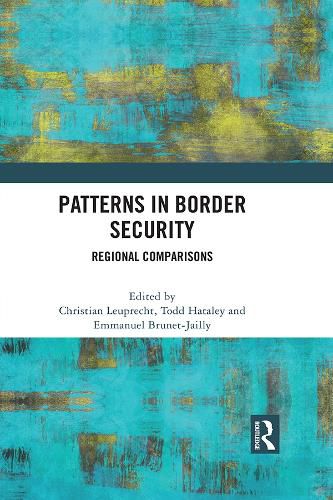Readings Newsletter
Become a Readings Member to make your shopping experience even easier.
Sign in or sign up for free!
You’re not far away from qualifying for FREE standard shipping within Australia
You’ve qualified for FREE standard shipping within Australia
The cart is loading…






How do security communities transform into security regimes? This book compares the construction of cross-border security regimes across five regions of the world to illustrate how trust emerges from the day-to-day relations of coordination, cooperation, or collaboration. Patterns in Border Security: Regional Comparisons studies the way borderland communities develop, implement, and align border policy to enhance their sense of security. Borders have been evolving rapidly in direct response to the multifaceted challenges brought on by globalization, which has had a nuanced impact on the way borders are governed and border security is managed. Taking a methodical comparative regional approach, this book identifies and contrasts determinants of nascent, ascendant, and mature border security regimes, which the book documents in seven regional case studies from across the globe. The findings identify conditions that give rise to cross-border and trans-governmental coordination, cooperation, or collaboration. Specifically, pluralistic forms of communication and interactions, sometimes far from the actual borderline, emerge as key determinants of friendly and trustful relations among both contiguous and non-contiguous regions. This is a significant innovation in the study of borders, in particular in the way borders mediate security. For six decades international security studies had posited culture as the bedrock of security communities. By contrast, the book identifies conditions, a method, and a model for adequate and effective cross-border relations, but whose outcome is not contingent on culture. The chapters in this book were originally published as a special issue of Commonwealth and Comparative Politics with a Foreword by the Secretary General of the World Customs Organization.
The Open Access chapters of this book, available at http://www.tandfebooks.com/doi/view/10.4324/9781003216926, have been made available under a Creative Commons Attribution-Non Commercial-No Derivatives 4.0 license.
$9.00 standard shipping within Australia
FREE standard shipping within Australia for orders over $100.00
Express & International shipping calculated at checkout
How do security communities transform into security regimes? This book compares the construction of cross-border security regimes across five regions of the world to illustrate how trust emerges from the day-to-day relations of coordination, cooperation, or collaboration. Patterns in Border Security: Regional Comparisons studies the way borderland communities develop, implement, and align border policy to enhance their sense of security. Borders have been evolving rapidly in direct response to the multifaceted challenges brought on by globalization, which has had a nuanced impact on the way borders are governed and border security is managed. Taking a methodical comparative regional approach, this book identifies and contrasts determinants of nascent, ascendant, and mature border security regimes, which the book documents in seven regional case studies from across the globe. The findings identify conditions that give rise to cross-border and trans-governmental coordination, cooperation, or collaboration. Specifically, pluralistic forms of communication and interactions, sometimes far from the actual borderline, emerge as key determinants of friendly and trustful relations among both contiguous and non-contiguous regions. This is a significant innovation in the study of borders, in particular in the way borders mediate security. For six decades international security studies had posited culture as the bedrock of security communities. By contrast, the book identifies conditions, a method, and a model for adequate and effective cross-border relations, but whose outcome is not contingent on culture. The chapters in this book were originally published as a special issue of Commonwealth and Comparative Politics with a Foreword by the Secretary General of the World Customs Organization.
The Open Access chapters of this book, available at http://www.tandfebooks.com/doi/view/10.4324/9781003216926, have been made available under a Creative Commons Attribution-Non Commercial-No Derivatives 4.0 license.